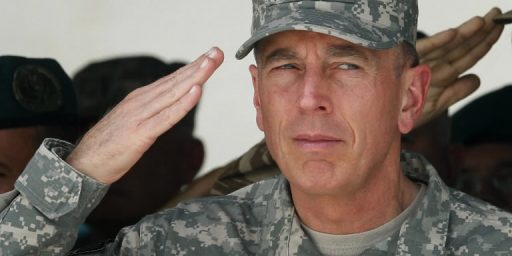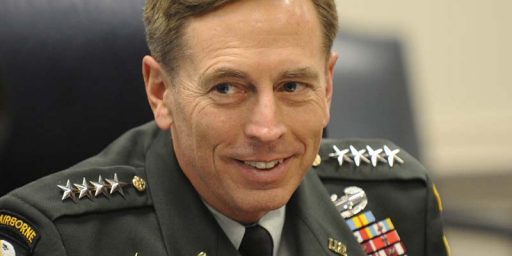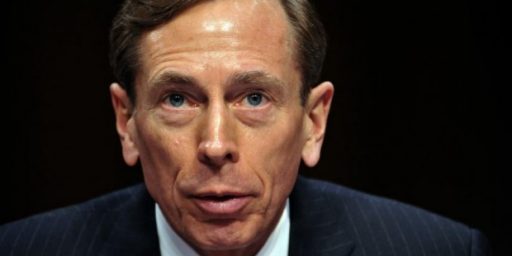Bush and the Generals
Dan Froomkin makes a rather serious charge: “President Bush . . . has a tendency to celebrate his generals when they’re providing him political cover — then stick a knife in their backs when they’re no longer of any use to him.”
His evidence for this assertion, however, is rather slim.
Last week, Bush rejected any blame for the chaos that ensued in Iraq after the March 2003 invasion. So whose fault was it? Bush pointed the finger at Gen. Tommy Franks, the Central Command chief at the time. “My primary question to General Franks was, do you have what it takes to succeed? And do you have what it takes to succeed after you succeed in removing Saddam Hussein? And his answer was, yes,” Bush said.
That’s the same Tommy Franks to whom Bush awarded a Medal of Freedom in 2004.
Rather clearly, though, if you read the full transcript of that press conference, that this was in response to a question: “Your critics say you failed to send enough troops there at the start, failed to keep al Qaeda from stepping into the void created by the collapse of Saddam’s army, failed to put enough pressure on Iraq’s government to make the political reconciliation necessary to keep the sectarian violence the country is suffering from now from occurring.”
Bush is defending himself from the charge, that has been repeated ad infinitem, that he ignored the advice of his generals in planning the war. He then gives a long response talking about all the generals he polled and who told him the plan was a good one.
And when virtually all of Bush military line of command, including the entire Joint Chiefs of Staff, opposed his “surge” proposal late last year, Bush responded not by listening, but by removing the top two commanders responsible for Iraq and replacing them with more amenable leaders, including Army Lt. Gen. David H. Petraeus.
Right. And everybody lauded the choice.
Petraeus, as it happens, wrote an op-ed in The Washington Post just five weeks before the 2004 election describing what he called “reasons for optimism” in Iraq. Now Petraeus is Bush’s “main man.” Maybe he should be watching his back.
Thomas E. Ricks writes in Sunday’s Washington Post: “Almost every time President Bush has defended his new strategy in Iraq this year, he has invoked the name of the top commander, Army Gen. David H. Petraeus. “Speaking in Cleveland on Tuesday, Bush called Petraeus his ‘main man’ — a ‘smart, capable man who gives me his candid advice.’ And on Thursday, as the president sought to stave off a revolt among congressional Republicans, he said he wanted ‘to wait to see what David has to say. I trust David Petraeus, his judgment.'”
Yet Ricks continues: “Some of Petraeus’s military comrades worry that the general is being set up by the Bush administration as a scapegoat if conditions in Iraq fail to improve,” he writes. “‘The danger is that Petraeus will now be painted as failing to live up to expectations and become the fall guy for the administration,’ one retired four-star officer said. . . .
“When Bush and his aides shift military strategy, they seem to turn on the generals on whom they once relied publicly, said Lawrence Korb, a former Pentagon official. During the run-up to the war, when Gen. Eric Shinseki, the former Army chief of staff, told Congress that more troops were needed to secure Iraq, he was publicly rebuked by then-Deputy Defense Secretary Paul D. Wolfowitz. More recently, Gen. George W. Casey Jr., Petraeus’s predecessor, was blamed for not doing more to improve security for Iraqi civilians, and Gen. Peter Pace, the chairman of the Joint Chiefs of Staff, was effectively fired last month by Defense Secretary Robert M. Gates. This is an administration that wants to blame the generals,’ Korb said.”
So, here’s the case for Bush stabbing his generals in the back:
- Bush says his generals approved the war plan yet he awarded the architect of the plan with the nation’s highest honor for his service.
- The administration later hired a general widely acclaimed on both sides of the aisle to clean up the mess.
- “[S]ome of Petraeus’s military comrades” — i.e., at least two people associated with the armed forces in some capacity or another –have expressed some sentiment that the author of FIASCO interprets as “worry.”
- George Casey, lampooned as an idiot in FIASCO and the Halls of Congress, was “blamed” by somebody or another “for not doing more to improve security for Iraqi civilians.” Which, rather demonstrably, was true. Bush later promoted Casey to the Army’s top job.
- A JCS Chairman that was widely viewed as a Yes man and who had no credibility with leaders of the new Democratic majority in Congress was quietly let go while being lauded for his years of faithful service.
One could conclude all manner of things from these facts, many of them unflattering to Bush. Stabbing his generals in the back for expediency is not among them.
It’s true that Bush, like many other war supporters, is using the “trust Petraeus” mantra as cover. There’s a rather benign explanation for that: He is still viewed as credible by the public and many Congressional Democrats. The president, alas, is not.






James,
I think there is a lot of truth to this. If you read Rick’s ‘Fiasco’ its pretty clear that the war planners were fixing their recommendations to fit the neocons’ preferences.
Frank initially advised on a force numbering 250,000 (and only because Shinseki got his ass kicked for estimating higher and correctly) but was told to go back to the drawing board..
President Bush’s assertion is a con- what he was really asking the generals around the table was ‘Are you prepared to put your names to our plan?’. If they answered ‘no’ they were out, if ‘yes’ then congratulations, the crap shoot’s yours’.
Regardless of backstabbing, I think it is pretty clear that Bush has done a lot of general shopping, and the threat of general shopping, finding the one or two that will implement whatever plan is on the Administration’s mind. I think that this may be worse than whatever “revenge” may be taking place.
“Listening to the generals” doesn’t mean much if you don’t actually listen to most of your generals.